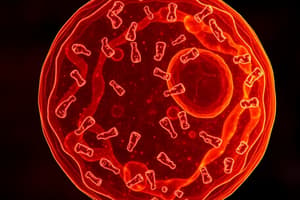Podcast
Questions and Answers
What is the primary function of the G1 phase in the cell cycle?
What is the primary function of the G1 phase in the cell cycle?
- Formation of nuclear membranes
- DNA duplication
- Cell growth and metabolic function (correct)
- Preparation for mitosis
Which phase of mitosis is characterized by chromosomes aligning at the cell's equator?
Which phase of mitosis is characterized by chromosomes aligning at the cell's equator?
- Telophase
- Anaphase
- Prophase
- Metaphase (correct)
What is the role of cyclins and cyclin-dependent kinases (CDKs) in the cell cycle?
What is the role of cyclins and cyclin-dependent kinases (CDKs) in the cell cycle?
- To condense chromatin into chromosomes
- To regulate and control the progression through the phases (correct)
- To form new organelles
- To facilitate DNA replication
What occurs during the S phase of the cell cycle?
What occurs during the S phase of the cell cycle?
Which of the following describes the outcome of cytokinesis?
Which of the following describes the outcome of cytokinesis?
What is a consequence of mutations in genes that regulate the cell cycle?
What is a consequence of mutations in genes that regulate the cell cycle?
During which mitotic phase does the nuclear envelope begin to break down?
During which mitotic phase does the nuclear envelope begin to break down?
How do checkpoints in the cell cycle contribute to cellular health?
How do checkpoints in the cell cycle contribute to cellular health?
Flashcards are hidden until you start studying
Study Notes
Ciclo Celular
-
Definición: Proceso mediante el cual una célula se divide para formar dos células hijas.
-
Fases del ciclo celular:
-
Interfase:
- Fase más larga del ciclo celular.
- Se divide en tres subfases:
- G1 (Fase de crecimiento): La célula crece y realiza funciones metabólicas.
- S (Fase de síntesis): Duplicación del ADN, se forman copias de cada cromosoma.
- G2 (Fase de preparación): La célula se prepara para la mitosis, se producen proteínas y organelos.
-
Mitosis:
- Proceso de división nuclear que se divide en cuatro etapas:
- Profase: La cromatina se condensa en cromosomas visibles; la envoltura nuclear comienza a descomponerse.
- Metafase: Los cromosomas alineados en el ecuador de la célula.
- Anafase: Las cromátidas hermanas se separan y se mueven hacia los polos opuestos.
- Telofase: Se forman dos nuevas envolturas nucleares alrededor de los conjuntos de cromosomas en los polos.
- Proceso de división nuclear que se divide en cuatro etapas:
-
Citosinesis:
- División del citoplasma que sigue a la mitosis, resultando en la formación de dos células hijas.
-
-
Control del ciclo celular:
- Reguladores como ciclinas y quinasas dependientes de ciclinas (CDK) que controlan el avance a través de las fases.
- Puntos de control en G1, G2 y M que aseguran que las condiciones sean adecuadas para proceder.
-
Importancia:
- Permite el crecimiento y desarrollo de organismos multicelulares.
- Asegura la correcta distribución del material genético.
- Es crucial para la reparación de tejidos.
-
Alteraciones:
- Mutaciones en los genes que regulan el ciclo celular pueden llevar a trastornos como el cáncer, donde el control del crecimiento celular se pierde.
Cellular Cycle
- Definition: Process through which a cell divides to form two daughter cells.
Phases of the Cellular Cycle
-
Interphase:
- Longest phase of the cellular cycle.
- Divided into three subphases:
- G1 (Growth Phase): Cellular growth and metabolic functions occur.
- S (Synthesis Phase): DNA duplication takes place, resulting in copies of each chromosome.
- G2 (Preparation Phase): The cell prepares for mitosis by producing proteins and organelles.
-
Mitosis:
- Nuclear division divided into four stages:
- Prophase: Chromatin condenses into visible chromosomes; nuclear envelope begins to break down.
- Metaphase: Chromosomes align at the cell's equator.
- Anaphase: Sister chromatids separate and move toward opposite poles.
- Telophase: Two new nuclear envelopes form around the chromosome sets at the poles.
- Nuclear division divided into four stages:
-
Cytokinesis:
- Division of the cytoplasm following mitosis, resulting in the formation of two daughter cells.
Control of the Cellular Cycle
- Regulators include cyclins and cyclin-dependent kinases (CDKs) that manage progress through the phases.
- Checkpoints in G1, G2, and M phases ensure appropriate conditions for progression.
Importance of the Cellular Cycle
- Facilitates growth and development in multicellular organisms.
- Ensures accurate distribution of genetic material.
- Essential for tissue repair processes.
Alterations in the Cellular Cycle
- Mutations in genes regulating the cellular cycle can lead to disorders, including cancer, where cellular growth control is lost.
Studying That Suits You
Use AI to generate personalized quizzes and flashcards to suit your learning preferences.




